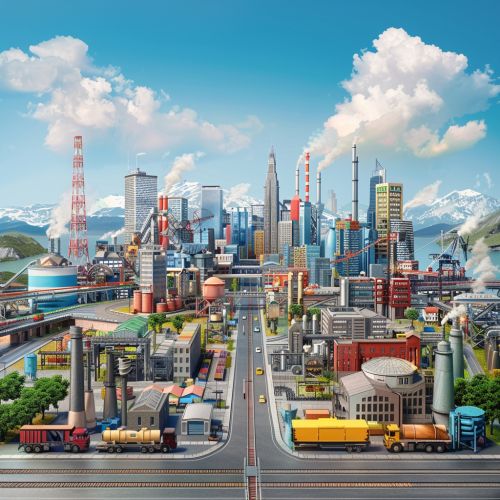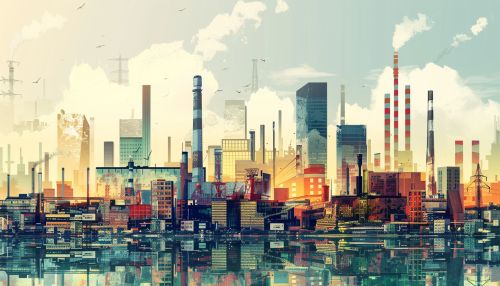Economic Development
Introduction
Economic development is a broad concept that encompasses the process by which a nation improves the economic, political, and social well-being of its people. It involves policies that governments undertake to improve the economic and social well-being of its citizens. This includes measures to increase the economic wealth of a country or region, to create jobs, and to improve the quality of life for its citizens.
Theories of Economic Development
There are numerous theories of economic development, each offering a different perspective on how economies grow and develop. These include the classical theory, the neoclassical theory, the structural change theory, the dependency theory, and the endogenous growth theory.
Classical Theory
The classical theory of economic development, pioneered by economists such as Adam Smith and David Ricardo, posits that economic development is driven by the accumulation of capital and the division of labor. According to this theory, economic growth occurs when there is an increase in the quantity of labor and capital in an economy.
Neoclassical Theory
The neoclassical theory of economic development, on the other hand, emphasizes the role of technological progress in driving economic growth. This theory suggests that economic development is a function of capital accumulation, labor growth, and technological progress.
Structural Change Theory
The structural change theory of economic development posits that economic development involves structural changes in the economy, such as shifts from agriculture to manufacturing, and from manufacturing to services. This theory suggests that economic development is a process of structural transformation that involves changes in the structure of the economy.
Dependency Theory
Dependency theory argues that economic development is influenced by the economic and political relationships between developed and developing countries. According to this theory, the economic development of developing countries is hindered by their dependence on developed countries.
Endogenous Growth Theory
The endogenous growth theory of economic development suggests that economic growth is generated from within a country or region, rather than being influenced by external factors. This theory emphasizes the role of human capital, innovation, and knowledge in driving economic growth.
Factors Influencing Economic Development
There are several factors that influence economic development, including natural resources, human capital, physical capital, and technology.
Natural Resources
Natural resources, such as land, water, minerals, and forests, play a crucial role in economic development. They provide raw materials for production and are a source of wealth for countries that have them in abundance.
Human Capital
Human capital, which includes the skills, knowledge, and experience of a country's workforce, is another important factor in economic development. Countries with a highly skilled and educated workforce are more likely to experience rapid economic growth.
Physical Capital
Physical capital, such as buildings, machinery, and infrastructure, is also a key factor in economic development. Investments in physical capital can lead to increased productivity and economic growth.
Technology
Technology plays a crucial role in economic development. Technological advancements can lead to increased productivity, improved efficiency, and economic growth.
Strategies for Economic Development
There are several strategies for economic development, including industrialization, agricultural development, investment in human capital, and technological innovation.
Industrialization
Industrialization is a key strategy for economic development. It involves the shift from an agrarian economy to an industrial one, characterized by large-scale manufacturing and production.
Agricultural Development
Agricultural development is another important strategy for economic development. It involves improving agricultural productivity and promoting sustainable farming practices.
Investment in Human Capital
Investing in human capital, through education and training, is a crucial strategy for economic development. It can lead to a more skilled and productive workforce, which can drive economic growth.
Technological Innovation
Technological innovation is a key strategy for economic development. It involves the development and adoption of new technologies, which can lead to increased productivity and economic growth.
Challenges in Economic Development
Economic development is not without its challenges. These include economic inequality, environmental degradation, political instability, and corruption.
Economic Inequality
Economic inequality is a major challenge in economic development. It refers to the unequal distribution of income and wealth within a country or region. High levels of economic inequality can hinder economic development and lead to social unrest.
Environmental Degradation
Environmental degradation is another major challenge in economic development. It refers to the deterioration of the environment through the depletion of resources, such as air, water, and soil, and the destruction of ecosystems. Environmental degradation can hinder economic development and negatively impact the quality of life.
Political Instability
Political instability is a major challenge in economic development. It can lead to economic uncertainty and discourage investment, hindering economic development.
Corruption
Corruption is another major challenge in economic development. It can lead to economic inefficiency, discourage investment, and undermine public trust in government.
Conclusion
Economic development is a complex process that involves a wide range of factors and strategies. It is crucial for improving the economic and social well-being of a country's citizens. However, it also presents several challenges, including economic inequality, environmental degradation, political instability, and corruption.


